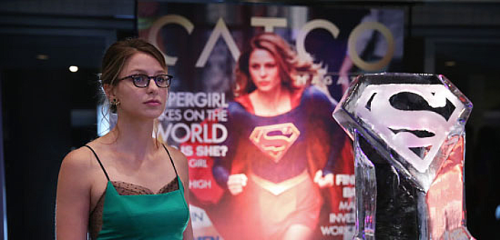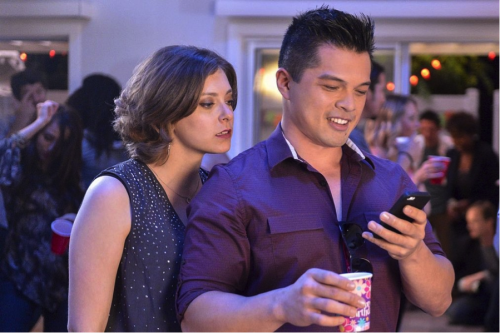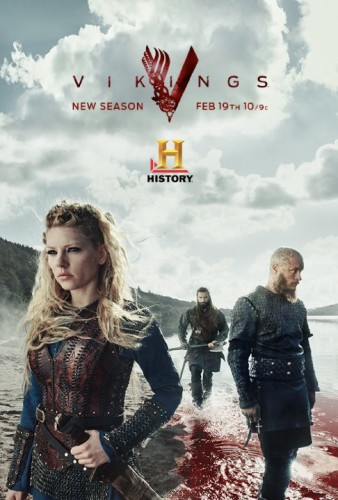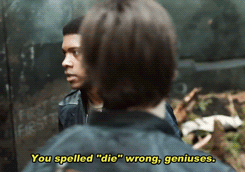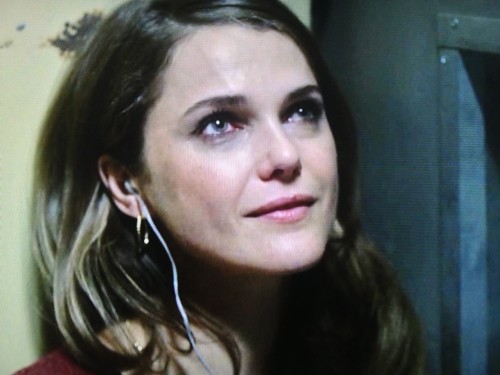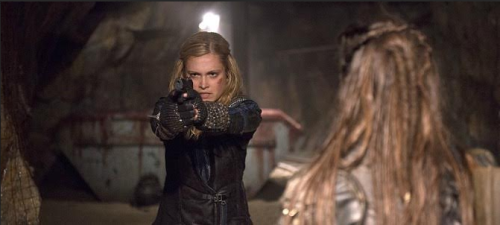
Mothers of Anarchy
This repost by Leigh Kolb originally appeared at And Philosophy and appears now as part of our theme week on Violent Women.
Sons of Anarchy revolves around the chaotic yet highly methodical world of a motorcycle club and the forces around them—from law enforcement and crooked cops to gangs and organized crime rings. The entire series focuses on politics, power, violence, and authority in incredibly masculine spaces.
However, these are sons. And to be a son is not only to be a son of a father—the cornerstone for so many monomyths in Western literature—but also to be a son of a mother. While Sons of Anarchy was ostensibly about Jax’s atonement with his dead father and monstrous father figure (thus the countless accurate comparisons to Hamlet), who really is “anarchy” in this world?
If we look at the definition of anarchy— “a state of disorder due to absence or nonrecognition of authority”—and focus in on the word “nonrecognition,” we can think about how throughout Sons of Anarchy, Gemma has been an authority figure in the domestic sphere—”fiercely” mothering her biological and nonbiological sons (she references wanting to have had a dozen sons in the final season, and really, she managed to do so through the MC), cooking meals, managing paperwork, and tending to children, all in the feminine sphere. Though she cannot ride, she and is seen as the ultimate “old lady.” She has power, and the men of SAMCRO, on some level, fear her.

Gemma’s violence
Her true authority, however, is not recognized. From the beginning, we understand her power in Charming. She ran off when she was a teenager, and, as Wayne Unser says, came back “ten years later with a baby and a motorcycle club.” There is implied ownership here; the club is Gemma’s. In reality, Gemma herself can be seen as embodying and perpetuating anarchy—in that she is an authority figure, but not recognized as such. The masculine sphere—the bikes, the guns, the gavel, the long table (hello, phalluses)—is seen as powerful. Violence, politics, gun deals, drug deals, more violence: masculine. Powerful.
At the end of season 6, Gemma violently clashes the spheres of power. She’s in the kitchen. She’s using an iron, and a carving fork. Using tools of the feminine sphere, she brutally murders Tara, because she fears that Tara is about to take control and dismantle the club—the life, the style of mothering and living—that she brought home with her so many years ago.
Anarchy is then truly unleashed; both parts of the definition resound throughout the final season. Jax’s authority is misguided (some might say absent) as he leads the club down a path of disorder and destruction. Because no one—not Jax, not Unser, not Sheriff Jarry—could recognize Gemma’s capabilities for brutality., Her authority, or rather her control of the situation, is left unchecked for most of the season. Had Abel not overheard her confess, she may well have gotten away with it. The Sons all underestimate the capabilities of women.

Tara cannot escape Gemma
In “Anarchism: The Feminist Connection,” Peggy Kornegger points out that
“Anarchism has been maligned and misinterpreted for so long that maybe the most important thing to begin with is an explanation of what it is and isn’t. Probably the most prevalent stereotype of the anarchist is a malevolent-looking man hiding a lighted bomb beneath a black cape, ready to destroy or assassinate everything and everybody in his path. This image engenders fear and revulsion in most people, regardless of their politics; consequently, anarchism is dismissed as ugly, violent, and extreme. Another misconception is the anarchist as impractical idealist, dealing in useless, Utopian abstractions and out of touch with concrete reality. The result: anarchism is once again dismissed, this time as an ‘impossible dream.’”
This anarchy dichotomy is at the heart of the central conflict of Sons of Anarchy: the “malevolent” club that Clay and Gemma wanted versus the “impossible dream” club that John Teller and Jax wanted. We now know that John Teller’s death was at his own hand (albeit somewhat forced), when he realized that the former was the fate of SAMCRO. As Jax rose up the ranks of SAMCRO leadership, he wasn’t just fighting Clay’s philosophy of anarchy—he was also fighting Gemma’s. After Jax killed Clay, the fight wasn’t over, even though he initially thought it was. But the club wasn’t his. Anarchy was his mother.
As Tara plots and schemes to get herself and her sons away from the world Gemma had created and helped sustain, Gemma sees her as a threat, and resorts to fully embodying that destructive, violent anarchy that could uphold the status quo.
Because she has operated within this culture of masculine violence, Gemma adopts the patriarchal problem-solver of violent destruction. Since Tara is a threat to the malevolent anarchy that Clay and Gemma desired, she—in Gemma’s mind—had to be eliminated. Whereas Tara worked with other women as she was trying to make her plans to escape Charming with Abel and Thomas, Gemma consistently alienated herself from other women.
In “Socialism, Anarchism And Feminism,” by Carol Ehrlich, she says that the “debate over ‘strong women’” is closely related to leadership, and summarizes radical feminists’ position to include the following:
“1. Women have been kept down because they are isolated from each other and are paired off with men in relationships of dominance and submission. 2. Men will not liberate women; women must liberate themselves. This cannot happen if each woman tries to liberate herself alone. Thus, women must work together on a model of mutual aid. 3. ‘Sisterhood is powerful,’ but women cannot be sisters if they recapitulate masculine patterns of dominance and submission.”
Tara could have checked off all of those goals easily; she was of a new generation of old ladies. Gemma, on the other hand, isolates herself, acts alone, and in attempting to be dominant and in control, adopts masculine ways of doing so. Clay, as a harbinger of evil, wanted Tara dead. But the other Sons accepted and respected her. Her role wasn’t club mother, it was club healer. The power that she held—that she could and did save Sons’ lives (and Abel’s life in the series pilot)—was a restorative power that ran counter to what Gemma offered. And the more Tara worked with other women, the more of a threat she became to Gemma and the club.
Gemma embodies Sigmund Freud’s “masculinity complex,” which posits that girls identify with their fathers but eventually must assume female social roles. Gemma’s mother, Rose, died of the same heart defect that Gemma has and that her son Thomas died from. Gemma remembers Rose in a conflicted way, and says in season 7 that she thinks Rose had never wanted to be a mother. Gemma, by contrast, says that all she ever wanted to do was to be a mother (to sons).
Her father, Nate, was a pastor. She speaks of him with love and admiration, and one can easily see (just as easily as critics have seen the Oedipal parallels with Jax and Gemma) her own Electra complex—the Jungian theory that girls identify with and have a fixation with their fathers. While Nate leads a church and congregants, Gemma leads an outlaw club and outlaws—her dozen sons are different kinds of apostles.
In Sigmund Freud’s lecture, “Femininity,” he says,
“A mother is only brought unlimited satisfaction by her relationship to a son; this is altogether the most perfect, the most free from ambivalence of all human relationships. A mother can transfer to her son the ambition which she has been obliged to suppress in herself, and she can expect from him the satisfaction of all that has been left over in her of her masculinity complex.”
In making Jax believe the Chinese killed Tara, Gemma is both preserving herself and continuing—whether consciously or not—the legacy that Clay would have wanted: destruction, violence, and chaos. She wants her son to live out her ambitions, to fully give himself up to the anarchy of her rebellious desires.
Tara’s rebellion—that Gemma could not seem to get over—is the antithesis of Gemma’s. Tara left Charming as a teenager, leaving Jax and the club because she wanted to escape. She became a talented doctor, and later returned to Charming. When she wanted to “transfer to her son(s) the ambition which she has been obliged to suppress in herself”—escaping Charming and the grasp of SAMCRO, Gemma sees this desire as running counter to her own ambition for her son and grandsons: to stay in Charming, and to stay in the MC.

Wendy and Tara collaborate
Both Tara and Gemma are underestimated by the men, in terms of the lengths they will go to in order to preserve their desires for their lives and their sons. Because women aren’t included in the ultra-violent, masculine club scene (and are instead relegated to being porn stars, escorts, or old ladies—all very “private” roles), Tara’s plots shock Jax. Gemma brutally killing Tara is out of the realm of possibility for feminine force.
Freud added in the aforementioned lecture:
“There is one particularly constant relation between femininity and instinctual life which we do not want to overlook. Suppression of women’s aggressiveness which is prescribed for them constitutionally and imposed on them socially favors the development of powerful masochistic impulses, which succeed, as we know, in binding erotically the destructive trends which have been divested inwards. Thus masochism, as people say, is truly feminine.”
Gemma almost got away with murder because the expectation of women is that they are nonviolent and are not aggressive. Specifically, the brutal way she killed Tara was, according to law enforcement and Jax, in keeping with gang violence because it was so horrifying and malicious. When Gemma and Juice convince Jax that it was one of Lin’s men who killed Tara, Jax kills him in the same way Tara was killed, thinking he was enacting just revenge. He was, instead, simply doing as his mother taught him.
Showrunner Kurt Sutter said, “This is a story about the queen and the prince.” It seemed as if Jax had been trying to reconcile with his father and father figure all of these years; instead, we realize he needs to reconcile with his mother. When he finally realizes this, it’s too late—Gemma has killed Tara, Juice killed Eli to protect her, and they lied and set off a series of massacres and gang violence. Everyone immediately believed Lin’s crew was responsible for Tara’s death, because it looked like brutal gang violence—certainly not something a woman could do. There was no Mayhem vote for Gemma, because she isn’t at the table. However, even in her final moments, Gemma gives Jax permission to kill her, because she knows it must be done. She’s mothering—and controlling—until the very end.
As Hannah Arendt points out in On Violence, “Violence can always destroy power. Out of the barrel of a gun grows the most effective command, resulting in the most instant and perfect obedience. What never can grow out of it is power.” As soon as Gemma kills Tara, her power starts rapidly declining. A conglomeration of Gertrude and Lady Macbeth, Gemma vacillates between justifying her actions and apologizing for them (but mostly justifying). As soon as she sets the stage for Jax to enact revenge upon the Chinese, his rage and misplaced revenge—without the understanding or agreement of the club—makes him less and less powerful. In the last episode, as he ties up all of his loose ends (see: killing everyone), he is losing power. By the end, he gives up himself, and his power—just like his father did—and commits suicide. Violence robs Gemma and Jax both of their power, their dignity, and their lives.
So who—and what—wins in this modern Shakespearean tale? Certainly not those who rely on a sense of vengeful justice and violence to ride through this life. In a patriarchal framework of understanding, these actions are seen as desirable and just. Instead, we must work toward a feminist ethic of care. Feminist psychologist and philosopher Carol Gilligan defines a feminist ethic of care as
“an ethic of resistance to the injustices inherent in patriarchy (the association of care and caring with women rather than with humans, the feminization of care work, the rendering of care as subsidiary to justice—a matter of special obligations or interpersonal relationships). A feminist ethic of care guides the historic struggle to free democracy from patriarchy; it is the ethic of a democratic society, it transcends the gender binaries and hierarchies that structure patriarchal institutions and cultures. An ethics of care is key to human survival and also to the realization of a global society.”
Gilligan’s research has shown that traditionally “feminine” approaches to care are about more than the individual—connectedness and care override a sense of individualism and justice. In Sons of Anarchy, the characters who most exemplify this care ethic are Nero and Wendy, who, at the end, are riding together to parent their children—biological and non—far away from Charming. They are friends, not lovers, and their goals are not for themselves, but for the safety of one another and their sons—sons who they desperately want to keep away from the individualistic, vengeful anarchy they were coming to know. Nero and Wendy are coincidentally both recovering addicts. In their recovery—from the literal and figurative drugs of their past—they care more deeply about one another and those around them than they care about their individual desires.

Wendy’s eventual ethic of care
Tara desired this kind of care for her sons, but couldn’t attain it in her lifetime because of the pull of Gemma and Jax’s patriarchal anarchy. After Gemma’s death, Jax is freed to fulfill Tara’s wishes, and legally makes Wendy the boys’ mother. As in so many Shakespearean dramas, women must die so that men will learn. However, what remains constant throughout Sons of Anarchy is that when the masculine ideals dissolve, and individuals cry, love, and care (exemplified in Tig and Venus’s powerful love scene in “Faith and Despondency”), intimacy and growth are possible.

Wendy and Nero escape with their sons, embodying the feminist ethic of care
As Nero and Wendy leave Charming, it’s clear that this, then, is the preferred way to ride—not “all alone,” as Jax does—but all together. Gemma stands by her way of mothering until the end. She’s distrustful and dismissive of teachers and school (whereas Wendy is passionate about Abel attending school), and she covertly gives Abel his grandfather’s SON ring, which he wears at the end of the finale. Jax, however, sees the dire need for care, not anarchy. “It’s not too late for my boys,” he says. “They will never know this life of chaos.” Ultimately, Jax is a tragic hero because he realizes that care, not justice, will heal and raise his children.
The feminism of Sons of Anarchy has been not only its complex, three-dimensional female characters and Gemma’s role as the rare female antihero, but also its tragic depiction of the end game of violent, individualistic patriarchy. Wrapped up in the tragedy of masculine justice and violent revenge, Sons of Anarchy lifts up of the feminist ethic of care.
Leigh Kolb is an instructor at a community college in rural Missouri, where she teaches composition, journalism, and literature. She wrote “Mothers of Anarchy: Power, Control, and Care in the Feminine Sphere,” for Sons of Anarchy and Philosophy, and recapped the final season of Sons of Anarchy at Vulture. She is an editor and staff writer at Bitch Flicks, where she has written about the feminism of Sons of Anarchy.
